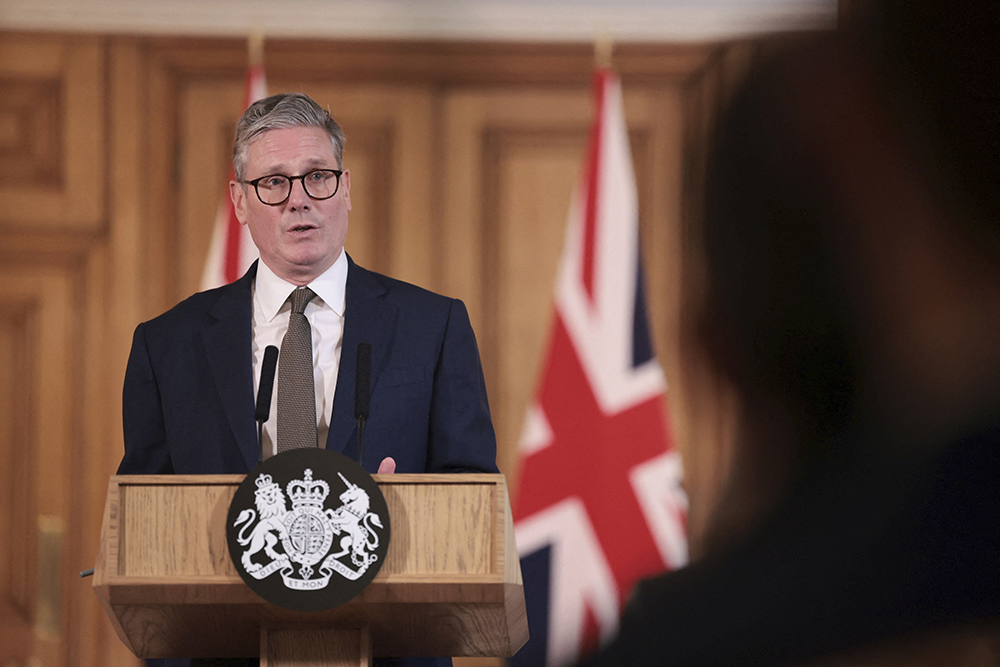|
Getting your Trinity Audio player ready...
|
(Breitbart) UK Prime Minister Sir Keir Starmer declared his willingness to deploy British troops to Ukraine “in harm’s way” to deter Russian aggression hours before he is set to join an ’emergency summit’ on the matter in Paris on Monday.
The United States and Russia are meeting to discuss the Ukraine war in Saudi Arabia this week, but European leaders have not been invited to send delegations. Apparently prompted by being left behind in this regard, and likely too by the Trump White House’s suggestion that European nations actually decide what they are actually capable of doing on Ukraine, European leaders are meeting in Paris today for an “emergency summit”.
Upping the stakes for other attendees before the meeting began, the British Prime Minister threw his weight behind French President Emmanuel Macron’s now long-floated plan to deploy European contingents directly to Ukraine to face down the Russians, saying he was now “ready” to deploy the British Army.
Announcing the policy change in an op-ed in the Daily Telegraph of London, UK PM Starmer wrote that the matters on the table are “existential for Europe as a whole” and that peace in Ukraine is only workable if Russia is sufficiently deterred from ever launching another invasion. Ukrainian President Zelensky also makes this a key demand of peace talks.
In a passage clearly meant for Washington after Trump’s emissary to the European defence elite, Vice President JD Vance scorched the increasingly illiberal continent for failing to underwrite its own defence and fearing the opinions of its own voters while forcing mass migration for them, Starmer wrote as if a truism that: “Europe and the United States must continue to work closely together”.
European nations must spend more on their defence spending to take on “a greater role in NATO”, Starmer said, noting: “We have talked about it for too long – and President Trump is right to demand that we get on with it”. Strident words, perhaps, but somewhat ironic given Starmer appears to be set on a course for more military cuts for the UK armed forces in a coming spending review.
The British Prime Minister wrote of his decision now to join the Macron plan to deploy to Ukraine in the future:
The UK is ready to play a leading role in accelerating work on security guarantees for Ukraine… being ready and willing to contribute to security guarantees to Ukraine by putting our own troops on the ground if necessary.
I do not say that lightly. I feel very deeply the responsibility that comes with potentially putting British servicemen and women in harm’s way. But any role in helping to guarantee Ukraine’s security is helping to guarantee the security of our continent, and the security of this country.
Exactly how many soldiers would be needed to form a credible deterrent against any future Russian aggression in Eastern Europe is unclear. Some estimates have spoken of 100,000, and that might be difficult for Europe’s hollowed-out military budgets despite it being a fraction of the million-man army talked of by President Zelensky.
Soldiers aren’t everything, and a great deal of other systems would presumably have to be forward-deployed to enforce a truce in Ukraine, not least among them air systems, including combat jets and air defence missiles. President Zelensky has previously said if Ukraine won’t be admitted into the protective umbrella of NATO — a difficult prospect if a peace deal sees Russia continue to occupy what the UN recognises as rightful Ukrainian land — it getting its own nuclear deterrent would be an acceptable alternative.
A problem for Sir Keir’s suggestion of a “leading role” in a European deployment to Ukraine is the state of the British Armed forces, which, while retaining its proud traditions and high level of training, has very much been reduced to a peacetime-size force. The United Kingdom barely spends two per cent of its GDP on defence — good for the free market and welfare, less good for credible deterrence — radically down from the five per cent of the late Cold War and even ten per cent in the 1950s.




